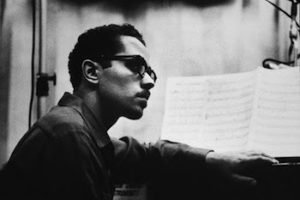
Hampton Hawes
Hampton Hawes, a Black jazz musician, was born on this date in 1928
Born in Los Angeles, California, Hawes came from a musical family (his mother played piano for the church where his father was a Presbyterian minister). Hawes taught himself to play piano by listening to records of 1930s jazz piano musicians. He began to play professionally while still attending Polytechnic High School. Hawes worked in New York but soon returned to Los Angeles, where he became an important piece of the burgeoning "West Coast" jazz school. He worked with Howard McGhee's band and Charlie Parker.
Hawes's first recording date was with Dexter Gordon and Wardell Gray in 1947. He played with Shorty Rogers on his 1951 Modern Sounds recording session and was occasionally at the Lighthouse Club during these years. Unfortunately, Hawes had developed a drug habit, and his induction into the U.S. Army did little to help his situation. After spending time in military prison for drug-related offenses, Hawes visited Japan, where he became an early admirer and lifelong friend of Toshiko Akiyoshi, a Japanese-American jazz pianist, composer/arranger, and bandleader, one of the very few successful female instrumentalists of her generation in jazz.
1955, Hawes recorded for Contemporary Records and formed a trio with Red Mitchell and Chuck Thompson. The trio's first album was successful, but it expanded to a quartet with the addition of guitarist Jim Hall. This set established Hawes as a major figure.
Also, in the mid-1950s, Hawes recorded with artists including Art Pepper, Bill Perkins, and Charles Mingus. A 1958 record date, “For Real!” with Harold Land, was the last time. Despite urging and advice, Hawes had sunk into acute drug dependency.
He went to prison for heroin possession when his musical importance and influence were at their height. Released in 1963 by the order of President John F. Kennedy, Hawes returned to recording for Contemporary and other labels in the USA, Europe, and Japan. In the 1970s, Hawes recorded studio and festival sessions, sometimes using the electric piano. His autobiography is called “Raise Up Off Me,” 1974.
Hampton Hawes died on 22 May 1977 in Los Angeles.
All That Jazz: The Illustrated Story of Jazz Music
General Editor: Ronald Atkins
Copyright 1996, Carlton Books Limited
ISBN 0-76519-953-X